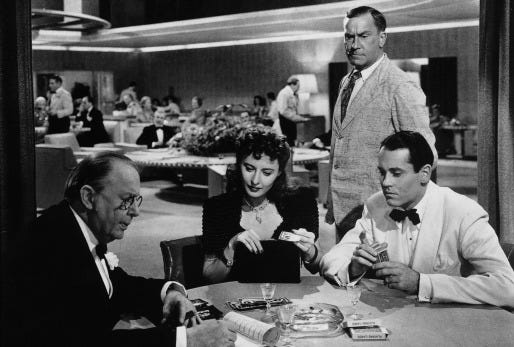The Lady Eve (1941)

I've been thinking about the Reeling Backward selections I've written about recently, as well as the piles of potential films to feature — mostly in the form of DVDs/Blu-rays sitting on my desk, stuff I've DVR'd off Turner Classic Movies and titles filling up my Netflix queue (more than 100, counting both streaming and DVD lists).
Conservatively speaking, it'll take me two to three years to get through all the films. And that's not accounting for any flux in the lists, as titles available for streaming suddenly disappear (annoying) or my interests change and I add new movies as I come across them (frequent). But it gives me a good idea of what sorts of things I've been watching or planned to watch.
Anyway, I've noticed a possibly disturbing trend: Reeling Backward has become a very testosterone-laden space. Most of the recent columns and queues are dominated by war pictures, crime stories, sports dramas and Westerns. There hasn't been a whole lot of comedy, and there's been even less of the "chick flick" variety.
The irony, of course, is that back in Hollywood's Golden Age they didn't think to divide films into "women's pictures" or "children's movies" or such. It was assumed that more or less everybody was more or less interested in every genre of film, and that as long as they made good pictures, people of all ages and genders would come to see them.
(They most definitely thought of a certain subset of movies as being for "colored people," and indeed there was a little-known subsystem of films produced for and even by black folks. But that's another story.)
Romantic comedies have been one of the mainstays of popular film going back to its silent days, and Preston Sturges was widely considered a master of the genre. "The Lady Eve" is one of his better-known examples. Technically it's best described as a screwball comedy, but since most screwballs were subsets of romantic films, the categorization still works.
What's most notable about the film is the way Barbara Stanwyck completely dominates the film, even with the considerable Henry Fonda as her leading man. Fonda plays Charles Pike, an ophiologist (snake expert) who also happens to be the heir to the Pike's Ale fortune. Charles, having just spent a year doing research in the Amazon, is a socially inept bumbler who seems uncomfortable around the hordes of women zeroing in on him.
Until, that is, he meets Stanwyck's Jean Harrington, a con woman and daughter of hoary card shark "Colonel" (a fictional title) Harrington (Charles Coburn). Jean is a schemer and a shyster but isn't quite the total mercenary that her father is. She finds herself genuinely falling for the patsy.
Their seduction scenes are quite electric, especially in that the man is totally submissive to the woman in a way you don't usually see in this era of film. First, she makes Charles remove her busted shoe and replace it with another, in a paean to foot fetishism that probably drove Quentin Tarantino crazy. Then she nudges him off the divan and and hovers over him, lustily stroking his hair, in a clear stand-in for another part of his anatomy. Her midriff-baring outfit is quite racy for the time.
Later, Charles is wised up by his bodyguard/protector Muggsy (William Demarest) that Jean and her dad are con artists, and he gives them the heave-ho. Segue to a few months later, and Jean decides to pull his chain again. Posing as a bogus Brit noble, the Lady Eve, she inserts herself into the upper-crust Connecticut set, and wheedles an invitation to a party being thrown by Charles' father, Horace (Eugene Pallette, famous for his rotund carriage and gravelly voice).
Of course, it's ludicrous that Charles wouldn't immediately recognize Eve as Jean. But he insists that someone trying to fool him would change their appearance, so the fact that she looks exactly the same is proof in his mind that they actually are two women. For a scientist, Charles seems pretty impervious to logic.
The dinner scene of Charles falling over himself as he is flummoxed by Eve remains a high point, with the doltish boy having to repeatedly change tuxedos when he keeps getting an array of food spilled on his duds.
In the end, he falls for Eve just as he did Jean, and following a quickie marriage, she extracts her revenge, fabricating a litany of former lovers (including at least one elopement) as part of the Lady Eve's backstory. Mortified, Charles literally jumps off the train they were riding to their honeymoon destination.
Eric Blore is a real treat as Sir Alfred McGlennan Keith, a fellow scam man who teams up with Jean to help her perpetrate her ruse as an English lady. I love how, when introducing himself to his fellow rascals, he prefaces his name with "at the moment" — indicating that such things are as interchangeable as the hats he favors.
I liked a lot of little bits and pieces about "The Lady Eve," though as a whole, I found it somewhat disappointing. The best screwball/romantic comedies have a little heart to them as well as flimflam — "It Happened One Night" being the classic example. "Eve" is straight go-go-go comedy, and in the end I felt more breathless than charmed.
Perhaps I'm just too used to manly flicks.
3.5 Yaps



